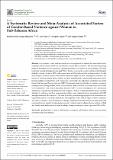| dc.description.abstract | A systematic review and meta-analysis were employed to address the associated factors of gender-based violence (GBV) in sub-Saharan African (SSA) countries. The Preferred Reporting Items for Systematic reviews and Meta-Analysis guidelines were followed. Ovid Medline, CINAHL, Cochrane Central, Embase, Scopus and Web of Science were used to source articles with stringent eligibility criteria. A total of 4931 studies were found and 50 studies met the inclusion criteria. Pooled meta-analyses revealed that low educational attainment, higher alcohol consumption, substance use, history of child and family abuse, limited decision-making skills, experiencing depression, males having multiple sexual partners, and younger age were found to be individual- and family-associated factors that increase the experiences of GBV. Community tolerant attitudes to violence, women's unemployment, being Muslim, lower socioeconomic class, food and social insecurity were found to be community- and societal-associated factors of GBV. Alcohol consumption, low educational attainment, experiencing depression, being younger, a history of child and family abuse, tolerant attitudes to violence, and low socioeconomic status were poignant factors associated with GBV amongst women in SSA countries. The need to develop a multipronged approach of intervention is a top priority in SSA to reach the Sustainable Development Goals' (SDGs) target of 2030 to eliminate all forms of violence. Socio-behavioural change communication interventions at individual and community levels need to be introduced, and interventions need to address the prevention of child and family abuse and increase women's feelings of empowerment in order to prevent GBV in SSA. | en_US |

